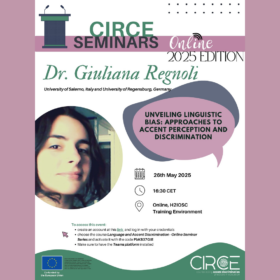
The Erasmus+ CIRCE project online seminar “Unveiling linguistic bias: Approaches to accent perception and discrimination’” will be held on 26May 2025 at 4:40 PM – 5:30 PM (CEST). Speaker: Giuliana Regnoli, University of Salerno, Italy & University of Regensburg, Germany.
The free seminar, organised by the CIRCE project in collaboration with DFCLAM University of Siena, H2IOSC project and Cnr-Istituto di Linguistica Computazionale “Antonio Zampolli”, will be included in the H2IOSC Training Environment to enable all interested parties to access the event registration.
Speaker Bio
Dr. Giuliana Regnoli is assistant professor of English linguistics at the University of Salerno and a postdoctoral research fellow at the University of Regensburg. Her research interests include variationist sociolinguistics, sociophonetics, language attitudes, perceptual dialectology, and World Englishes. She is currently working on children’s English in Cameroon and Italian university students’ attitudes toward English(es) world-wide.
Summary
Accent discrimination remains one of the most pervasive forms of linguistic bias, influencing social perceptions, identity construction, and attitudes towards language variation. This talk examines how accents shape linguistic hierarchies and social interactions, drawing on three research projects that employ distinct methodologies.
First, we will explore how folk linguistic methods, such as map-drawing tasks, reveal nuanced spatial dimensions of language attitudes, challenging homogenising conceptualisations of World Englishes. This will be illustrated through a study on how a first-generation Indian diasporic community in Germany perceives and evaluates accent variation in Indian English.
We will then turn to traditional language attitude research methods, focusing on questionnaire data to investigate overt stigmatisations and highlighting the importance of scale validation in direct attitude measurement. This discussion will be grounded in a pilot study on Italian university students’ direct attitudes towards English in Italy and their perceptions of Italian English.
Finally, we will examine language attitudes in primary education in Cameroon, emphasising the importance of understanding children’s language perceptions within broader ideological frameworks. This analysis draws on data from parental and children’s questionnaires, as well as semi-structured interviews with children. By shedding light on early linguistic gatekeeping and its role in decolonising language education, this study also explores when and how these beliefs become embedded in society.
Taken together, these projects demonstrate how different methodological approaches can be employed to investigate attitudes towards accents and linguistic variation, ultimately providing insights into how we can better understand and tackle accent discrimination.

